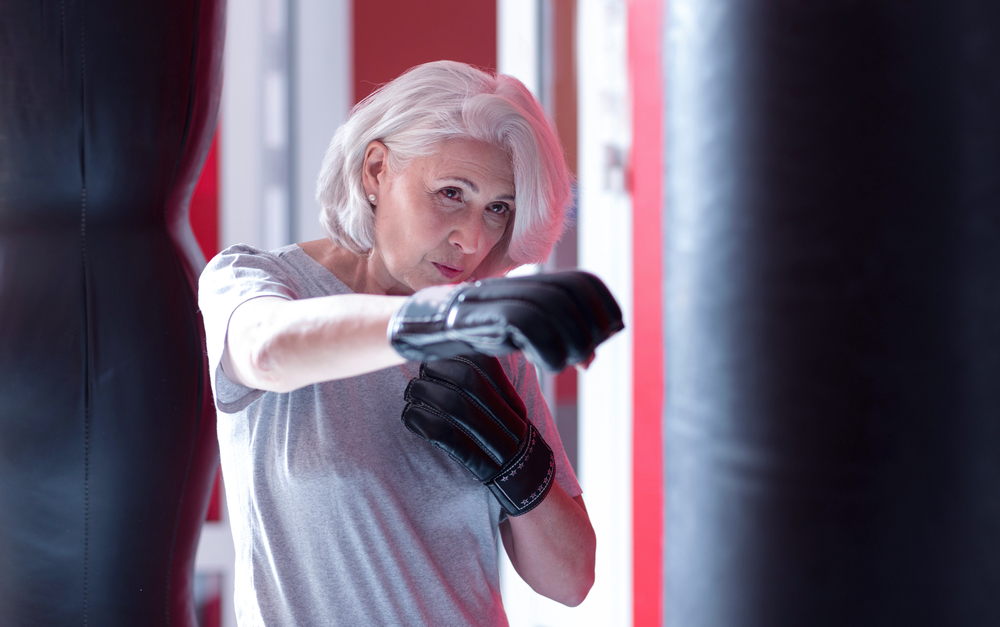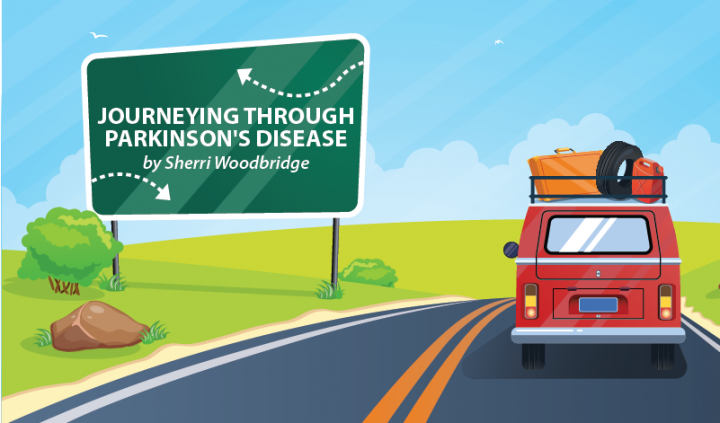Fighting Back Against Parkinson’s and Holding onto Hope

I often refer to my journey with Parkinson’s disease (PD) as a battle I am fighting. One Merriam-Webster definition of battle is “an extended contest, struggle, or controversy.” Another is “a struggle to succeed or survive.” To go to battle is to engage in a fight or a struggle. It is to put forth a determined effort.
You’ve likely heard someone at some part of your Parkinson’s journey say that no two cases are alike when it comes to this disease. Everyone with Parkinson’s wears the disease differently. Some can appear not to have it at all, despite being many years post-diagnosis. Others may have been diagnosed recently and can look as if they have lived with the disease for quite some time.
We’re all different, and because we are all different, we respond differently to life situations, including our PD encounters. For one patient who doesn’t struggle as much as another with their symptoms, life may not seem quite so hard. For another who struggles a great deal on a daily basis, it may feel like more than a struggle. It may feel as if they have entered into the throes of a real battle or a knock-down, drag-out fight.
I received a comment from a reader who didn’t agree with my use of the word “fight” to describe any response to a neurological disease. (I thank her for the feedback and welcome more!)
The reader referred to quotes from The Atlantic‘s 2014 article, “The Trouble With Medicine’s Metaphors”:
“… studies that have interviewed cancer patients around the time of diagnosis and followed them for years after have found that patients who view their disease as an ‘enemy’ tend to have higher levels of depression and anxiety, and poorer quality of life than those who ascribe a more positive meaning. They also tend to report higher pain scores and lower coping scores.”
The article, by
“More recent work has found that patients encouraged to ‘fight’ may feel that they have to suppress their emotional distress and maintain a positive attitude to avoid upsetting family members—and clinicians.”
Join the Parkinson’s forums: an online community for people with Parkinson’s Disease and their caregivers.
The reader who commented on my column said, “There is an assumption, when using the word ‘fight,’ that there is a possibility that the disease victim can ‘win’ and when the disease wins (always wins in the end) it seems like the victim was somehow at fault, was not strong enough, wise enough, ‘lost the fight’ or whatever. This is not so – the disease always gets the victim in the end.”
I understand where this reader is coming from (truly, I do). But to me, the comment unintentionally serves to strip me of hope by getting me to go back to that place at the beginning of my journey. I knew what Parkinson’s was. I knew what it could — and very well might — do. But I couldn’t sit by and watch it claim my spirit.
I still had hope, and I knew that as long as I held fervently and tightly to that hope, I may go down. But I would go down fighting.
Last night, I attended my first Rock Steady Boxing class. Their motto is “Fighting Back Against Parkinson’s.” You have to fight to win. Just as having PD looks different on everyone who has it, winning at PD looks different for everyone as well.
I can’t tie my shoes anymore, but I can fasten the Velcro on my sandals. That’s a win. I can start out my day shuffling, but after my first round of meds, I’m ready to walk with the best of them. That’s a win. I can’t work in my garden for hours on end anymore, but I can give it 20 to 30 minutes a day. That’s a big win.
I do not own a pair of rose-colored glasses. Some of us take harder punches from this disease than others, myself included. That said, reminding a person with any disease of any severity that hope is always available to them is one of the greatest things you can do for them. It’s not a question of will; it’s a question of faith. When you have faith, you have hope, and hope gives you courage. Courage enables you to put forth perhaps the greatest effort, the greatest fight, you’ve ever been called to put forth. If you fight, this may be the day you can button your shirt. And I’d call that a win.
***
Note: Parkinson’s News Today is strictly a news and information website about the disease. It does not provide medical advice, diagnosis or treatment. This content is not intended to be a substitute for professional medical advice, diagnosis, or treatment. Always seek the advice of your physician or another qualified health provider with any questions you may have regarding a medical condition. Never disregard professional medical advice or delay in seeking it because of something you have read on this website. The opinions expressed in this column are not those of Parkinson’s News Today or its parent company, Bionews Services, and are intended to spark discussion about issues pertaining to Parkinson’s disease.








Comments
ART DUBOW
I read your blogs faithfully and find them helpful in understanding the Parkinson's Disease participants in our ping pong group (we meet weekly). Thanks. ART
ART DUBOW
Ms. Woodbridge: I read your columns faithfully and find them very helpful in understanding Parkinson's Disease patients with whom I participate in weekly groups (we have a ping pong group). Thanks.
Sherri Woodbridge
Art - thank you for your comment and I’m glad my articles are helpful. Keep up the ping pong!
Brenda Godlove
Sherri, I thank you for sharing your hope! I look forward to reading your column. Your faith and encouragement are a breath of fresh air. It has only been 1 year since my diagnosis. I am learning all about this disease and am trying to battle some of the initial symptoms and effects of medicine. Please keep sharing your life lessons and encouragements. You are a blessing.
Sherri Woodbridge
Brenda - Thank you so much for your comments. I appreciate them so much! Have a great day!
Karen Bate
Sherrie,
As always you help us think about our situation in a more positive way. Those of us who struggle with depression need to hear the brighter side of a not so good illness. I usually read your pieces a couple of times. It really helps me to see that all is not lost and there is still hope to live a more grateful life and thus a better one.
Keep sharing your thoughts with us. You are a blessing, Sherrie. God is using you mightily!
Sherri Woodbridge
Thank you so much, Karen, for your kind words and encouragement. Once in a while it is nice to be told you’re making a difference because of this disease! Have a wonderful day!
Cheryl Hill
Hi Sherri, I knew you when you lived in Scott’s valley and I taught wth Esther, and Diane has been in our Sunday night Bible study for years. We have read your blog before and especially enjoyed this one. My husband Rick so agrees with your concept of "fighting the battle" and loves his Rocksteady boxing program, Including all the boxers he has gotten to know. He does a newsletter for the Santa Cruz chapter and would love to include this in the next issue, but wants your permission first. Blessings to you and your family on this journey.
Sherri Woodbridge
See email response...
Esther Woodbridge
Sherri dear,
Wonderful writing as always - and so helpful and inspiring! I love you, dear one.
Sherri Woodbridge
Thanks so much, Nana!!!
Keith
I'm new to parkinson treatment and so far don't feel there is much effort by providers to help establish a treatment regime. So far my experience has been "take this medication and come back to see me in 3 months..six months, etc." I suppose I was expecting more of a regimented approach especially as to information. My orientation has been "we don"t know what causes it and there"s no cure.
Is this a typical scenario and am I expecting to much?
Thank you
Sherri Woodbridge
Hi Keith - sorry to hear you’ve joined the ranks, but glad to have you here. The medication regime so very different for each individual that sometimes I think it’s a nightmare for physicians as well. You are not expecting too much. When you begin to expect less, you begin to give up. Fight for your life. It seems, from my experience - and it’s varied from a doctor who seemed that he didn’t care about my health one way or another, to the best doctor I think there ever was. It depends on where you live as to what’s available. Try as hard as you can to get hooked up with a movement disorder specialist- it will make a big difference in terms of your care. You’ll have to take a list of your questions with you if you want answers and if you aren’t satisfied with the answers, get another doctor til the fit is right. Unfortunately, there is no cure but there is much that can be done to make things easier so ask about that. Let me know what happens and if you have any other concerns, holler.
Keith
Thank you Sherri for your reply. It's important to hear there is some commonality in our experience. I agree with your fight assessment of our opportunity. This lack of control is something new for me and my "fight or flight" instinct is surging.
I've already learned more from your response than I have from the specialists I've seen. A movement disorder Specialist. First time it's been mentioned.
Thanks again and I will stay in touch.
John Wilcox
I am having the same experience as Keith. Continue the carbidopa-levodopa and see me in six months. The only thing that is done is to check my leg strength and that is it.
Louisa
My husband (who was a star athlete in high school and remained active throughout life) is also having the same treatment as Keith, take the carbidopa-levodopa and see me in six months. Thanks for the tips about seeing a movement disorder specialist. He has taken Tai Chi as therapy and another Parkinson’s therapy involving balance training and large movements, but did not stick with it. Perhaps if I can find such a Specialist they could help me to explain the need to continue therapy and give other pointers.
Sherri Woodbridge
Ask your regular neurologist about Movement disorder specialists near you and if you have to drive a couple hours it’s worth it. You can email me and tell me what area you are in (if in the US) and I may be able to get you a name to start with.